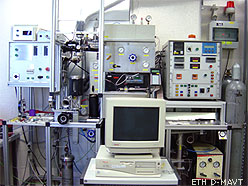|
ETHistory 1855-2005 | Rückblicke | Departemente | MAVT | none | Separation Process Laboratory SPL |
|
|
Wichtiger Hinweis:
Diese Website wird in älteren Versionen von Netscape ohne graphische Elemente dargestellt. Die Funktionalität der Website ist aber trotzdem gewährleistet.
Wenn Sie diese Website regelmässig benutzen, empfehlen wir Ihnen, auf Ihrem Computer einen aktuellen Browser zu installieren.
Weitere Informationen finden Sie auf
folgender Seite.
Important Note:
The content in this site is accessible to any browser or Internet device,
however, some graphics will display correctly only in the newer versions of
Netscape.
To get the most out of our site we suggest you upgrade to the latest
Netscape.
More information
The Separation Processes Laboratory (SPL) has been founded in 1997 within the Institute of Process Engineering. Its research activity builds upon the chemical engineering science fundamentals, and deals in particular with adsorption based separations and chromatography, and with crystallization and precipitation processes.
 Gas Antisolvent Recrystallization process for the precipitation of micro- and nano-particles of pharmaceutical substances using supercritical CO2 as antisolvent. |
In the former area the main interest is for preparative chromatography, particularly continuous Simulated Moving Bed chromatography, as well as for adsorption under supercritical conditions (see figure). In the area of crystallization, the focus is on cooling crystallization, and on precipitation from solution using either a liquid or a dense gas, e.g. near-critical carbon dioxide, as antisolvent. Key aspects of the research activity are the use of advanced tools for modelling, design and optimization of separation processes, thus realizing a tight synergy among theory, modelling, and experiments. |
The expertise in the two technological areas mentioned above is utilized in two broad application areas. The first is the production of bio-pharmaceuticals. Key applications are the chromatographic separation of enantiomers of chiral compounds, the chromatographic purification of bio-molecules, e.g. proteins and plasmid DNA, the crystallization and precipitation of organic compounds, the production of micro- and nano-sized particles aimed at controlled drug delivery applications.
The second application area is the development of sustainable energy systems. In particular, the SPE studies processes for the capture and sequestration of carbon dioxide to reduce its emissions upon combustion of fossil fuels. Specific techniques that are analyzed involve absorption and adsorption processes for the capture of carbon dioxide from power plant flue gases or directly from air, and different approaches for the storage of carbon dioxide after capture. The latter include mineral carbonation, i.e. the reaction of carbon dioxide with natural silicates to produce stable carbonates and silica, which is carried out in an aqueous solution, thus involving first dissolution of the silicates and then precipitation of the products, and enhanced coal bed methane (ECBM) recovery, i.e. the storage of carbon dioxide in unmineable coal seams upon displacement of the formation methane and adsorption in the coal micropores. The laboratory cooperates with other institutes at ETH (particularly the Institute for Chemical- and Bio-engineering, and the Institute of Automatics) and research centres abroad, as well as with Swiss and international companies.
|
|